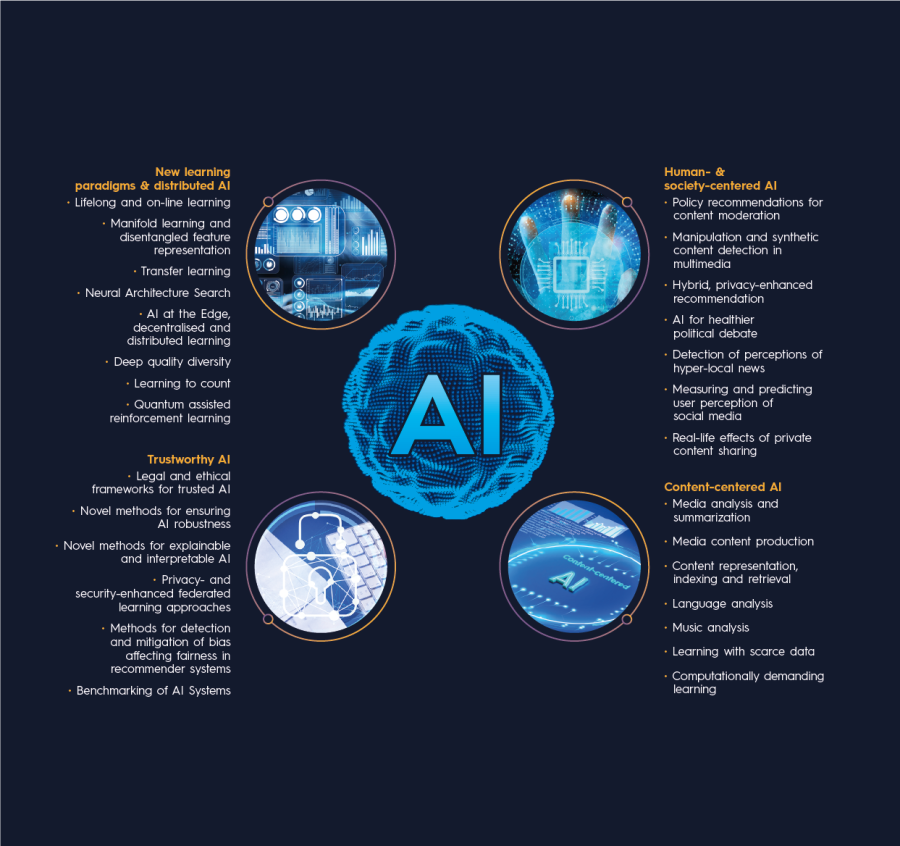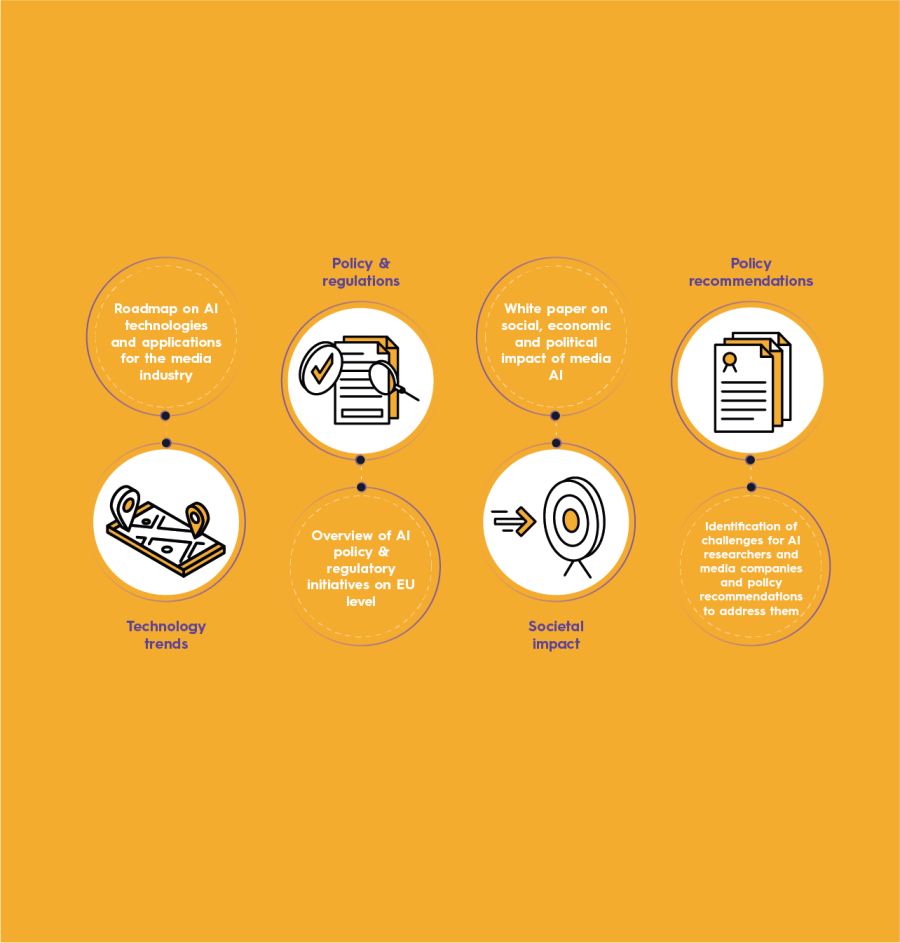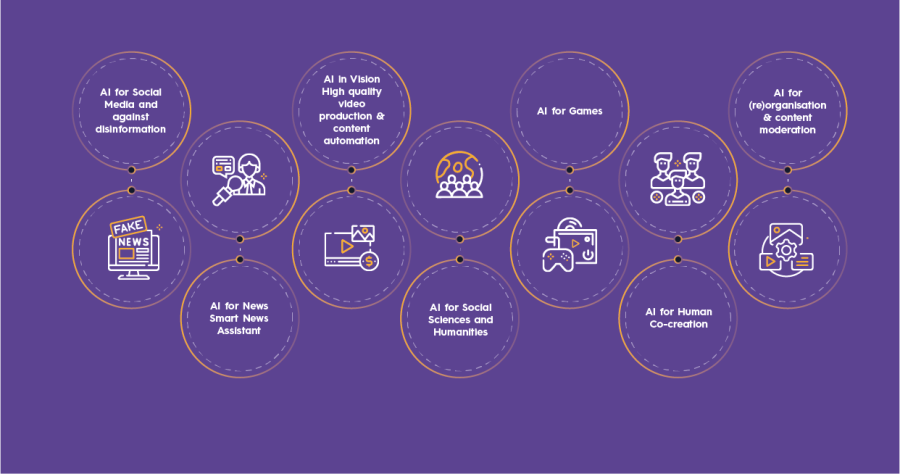AI for the Media industry: an opportunity for transformation
The world is changing. Following a series of breakthroughs in the field of Artificial Intelligence, new technologies are emerging which are ushering in a wave of revolutionary innovations in nearly all aspects of business and society. The Media industry is already benefiting from AI advancements that can significantly facilitate, enhance or transform important tasks, including automatic content creation, content recommendation and personalisation, multi-modal content search, multilingual translation, disinformation and manipulated content detection, social media analysis and trend detection, online debate analysis, forecasting and decision support, and many more. Further advances in AI have the potential to transform the media industry and revolutionise how operations run and how content is created, delivered and consumed while they can also offer trustworthy solutions with a societal impact, aiming to improve political participation, increase social cohesion, equip journalists and citizens against disinformation, and encourage healthy online debate and social interaction. At the same time, the use of AI in the media comes with significant challenges and risks for individuals and society that should be efficiently addressed in order to fully enjoy the benefits of this technology.
A Strategic Research Agenda on AI for the Media Industry
The AI4Media H2020 project is building a European Network of Excellence in Artificial Intelligence for the Media, Society and Democracy that will glue together the pieces of the currently fragmented European AI landscape, address significant technical, legal, ethical and application challenges, and promote a unique brand of European Media AI.
Towards this end, AI4Media has developed a Strategic Research Agenda (SRA) on AI for the Media Industry that lays out the strategic plan for AI4Media's R&I activities, presenting the main research themes to be tackled by the consortium, explaining the current challenges, the research directions that need to be pursued to address them, the media industry applications, and the potential impact of this research.
The AI4Media Strategic Research Agenda comprises the following elements:
- An AI for Media Observatory to monitor the AI policy/regulatory landscape, AI societal impact, and AI technology trends, providing insights, analyses and recommendations for policymakers, industry and researchers.
- Research on four core AI areas that will help reinforce and extend Europe's expertise in AI for Media. These include: new machine learning paradigms, trustworthy AI, content- centered AI, and human/society-centered AI.
- Real-world case studies showcasing how to transform AI research into practical applications for the media industry with concrete impact to society and the economy.
- AI education and AI skills development through the establishment of a prestigious European PhD programme on AI, a flexible mobility program, and open calls for funding research labs and SMEs working on media AI
The full version of the AI4Media SRA is available on the project website: https://www.ai4media.eu/strategic-research-agenda-on-ai-for-the-media-industry/
Crucial areas for Media AI research
To realise the enormous potential of AI will require breakthroughs in several domains such as:
- Machine learning (ML), aims to address important challenges of current ML techniques, including learning with little data, learning on-the-fly, transfer of knowledge and optimal AI architectures. In addition, research should also focus on distributed AI systems running on heterogeneous devices but also disruptive technologies currently at the laboratory stage such as Quantum-assisted Reinforcement Learning.
- Content-centered AI technology is valuable for the media industry and marketable as end-user services, such as multimedia metadata extraction, summarisation, and clustering, automatic audiovisual content generation and enhancement, linguistic analysis, and media-specific core technologies to improve learning performance.
- Human and society-centered AI technology, to equip citizens and media professionals with a set of tools that can be used to counter the effects of media manipulation and disinformation, enhance the understanding of online debates, support the analysis of perceptions of social media and the effects of online data sharing, and improve local news understanding without being limited by language barriers.
- Trustworthy AI techniques, that aim at providing a framework for the development of the technologies mentioned above that guarantees their suitability with respect to democratic and ethical values. Research should focus on robustness against threats and malicious attacks, explainability AI decisions, fairness and mitigation of bias of AI models, and techniques for privacy-preserving AI.
The AI4Media Strategic Research Agenda explores these four research themes, examining several research directions per theme, aiming to keep up with existing and emerging AI research trends but also address the needs and challenges of the media industry.
In addition to core AI research, it is important to be able to make sense of AI developments and their impact on individuals, society, and the economy by combining expert technical knowledge, industry experience, socio-economic analysis, and legal analysis. Research in this direction includes:
- Analysis of regulatory and policy landscape in Europe and beyond, concerning AI ethics initiatives. This includes aspects of trustworthy AI, Intellectual Property rights, Safety and Liability regimes, use of AI in education, culture, and audio-visual sector, the AI Package including the AI Act, etc. In addition, the potential impact of the anticipated EU regulatory initiatives on the field of AI for the media should also be analysed.
- Analysis of AI for media technology trends and exploration of relevant opportunities, challenges and risks. This line of research aims to discover the opportunities offered by AI to i) the media industry to transform workflows, assist media professionals and enhance the user experience in different sectors; ii) AI researchers to understand industry needs and recognize emerging research trends; and iii) social scientists and policymakers to comprehend facilitators, challenges and risks of media AI, resulting in more effective policies.
- Analysis of the societal, political, and economic impact of media AI technology and applications. There is a need to gain a more informed and detailed overview of the potentials and challenges faced specifically by the media sector as a whole when adopting AI, aiming to better understand the impact of media AI on society, politics and the economy and address major societal concerns.
- Development of policy recommendations to address the challenges encountered by media companies and AI researchers but also legal and societal challenges. This research will help raise awareness in the media sector about the importance of AI ethics and will help policymakers understand the challenges within the media industry and academia and act accordingly while drafting legislation, policy frameworks, and regulations.
Use cases in media, society and politics
The AI4Media Strategic Research Agenda also briefly explores seven media-related use cases, covering a variety of topics such as disinformation, news research and production, media moderation, organisation of audiovisual archives, game design, human-machine artistic co-creation, social science research etc. The use cases aim to address significant challenges currently faced by different media industry sectors and to highlight how AI applies throughout the media industry value chain, from research and content creation to production, distribution, consumption/interaction, performance and quality measurement.
- AI for Social Media and Against Disinformation. The provision of AI-powered support functions for human decision-making in the content verification workflow can make this complex task more efficient, easier to conduct for non- experts and more impactful. This has the potential to strengthen the role of news media organisations in counteracting disinformation and detecting synthetic media.
- AI for News - The Smart News Assistant. The fragmented media landscape requires news creators to be present on an increasing amount of diverse media platforms. Since every platform has its own way of storytelling, support for semi-automatically creating different formats of the same news story is needed. Building a hybrid human-machine news workflow by integrating AI-driven components in critical creative news processes can help journalists create relevant, trustworthy stories that reach a broader audience.
- AI in Vision - High quality Video Production and Content Automation. AI can support Public Service Media in the transition from its traditional business to the modern digital era. One of the main challenges to explore is the exploitation of AI’s potential to underpin and speed up content production processes in modern TV production environments and to enhance existing audio-visual content, coming from various sources such as broadcasters’ archives and social media.
- AI for Games. The cost/labour intensity of video game development is increasing due to competition and quality requirements. Practitioners in video game production have a strong need for automating manual and repetitive tasks, e.g. playing through games each time an iteration or content addition is completed. AI methods must be deployed in ways that are readily available, fit in existing workflows in tools for non-AI-expert users, and apply to highly variable game designs.
- AI for Content Organisation and Content Moderation. Novel, creative methods for image/ video content (re)organisation and tools for fast and accurate identification of problematic visual content (propaganda, violence, nudity, etc.) are critical for the adaptation and survival of media companies in the era of user-generated content.
- AI for Human Co-creation. The integration of advanced AI tools for audio generation, and their interaction with non-expert users to create novel music, is a difficult challenge from both a technical and an artistic perspective. Bringing to non-experts the possibility to use novel generative tools has the potential to enhance their capabilities to explore new artistic territories.
- AI for Social Sciences and Humanities. AI tooling for SSH research will help scholars to perform data analysis on both a macro and micro level so that they are better equipped to investigate biases and issues around framing and representation in media content. This presents an interesting challenge for AI tools as these concepts are largely dependent on the specific context of investigation and are difficult to translate into technical specifications.
Conclusion
We hope that the AI4Media Strategic Research Agenda on AI for the Media Industry becomes a valuable tool for AI researchers, media practitioners and policymakers. At the same time, we would like to initiate a discussion and debate within the broader community that could result in additional contributions for future versions of this Agenda, thus making it a living document depicting the current status of AI research and applications for Society and Media.
We look forward to discussing any questions or ideas that you have. Do not hesitate to write to us in the comments section below, send an email or reach out through our social media!
This blog post has been co-authored by
- Dr Filareti Tsalakanidou, AI4Media Project Manager and Research Associate in the Information Technologies Institute, Centre for Research and Technology Hellas, Greece, and
- Dr Yiannis Kompatsiaris, AI4Media Coordinator and Director of the Information Technologies Institute, Centre for Research and Technology Hellas, Greece.
How to contact us
Website: https://www.ai4media.eu/, Email: info@ai4media.eu
Social media: Twitter, LinkedIn, Facebook, YouTube
Acknowledgment
AI4Media has received funding from the European Union’s Horizon 2020 research and innovation programme under grant agreement No 951911.



- Prihlásiť sa na účely uverejňovania komentárov
- Značky
- Artificial Intellience Trustworthy AI conten-centered AI machine learning AI; AI4MEDIA; Media

